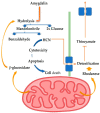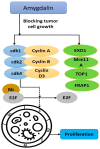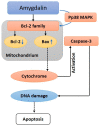Amygdalin: A Review on Its Characteristics, Antioxidant Potential, Gastrointestinal Microbiota Intervention, Anticancer Therapeutic and Mechanisms, Toxicity, and Encapsulation
- PMID: 36291723
- PMCID: PMC9599719
- DOI: 10.3390/biom12101514
Amygdalin: A Review on Its Characteristics, Antioxidant Potential, Gastrointestinal Microbiota Intervention, Anticancer Therapeutic and Mechanisms, Toxicity, and Encapsulation
Abstract
Bioactive amygdalin, found in high concentrations in bitter almonds, has been recognized as a symbol of the cyanogenic glycoside chemical organic substance, which was initially developed as a pharmaceutical for treating cancer after being hydrolyzed to hydrogen cyanide (HCN). Regrettably, research has shown that HCN can also damage normal cells, rendering it non-toxic to the human body. Extreme controversy surrounds both in vivo and in vitro studies, making its use risky. This review provides an extensive update on characteristics, antioxidant potential, gastrointestinal microbiota intervention, anticancer therapeutic, mechanisms, toxicity, and encapsulation of amygdalin. Antioxidant, anti-tumor, anti-fibrotic, antiatherosclerosis, anti-inflammatory, immunomodulatory, and analgesic characteristics, and the ability to improve digestive and reproductive systems, neurodegeneration, and cardiac hypertrophy are just some of the benefits of amygdalin. Studies verified the HCN-produced amygdalin to be harmful orally, but only at very high doses. Although intravenous treatment was less effective than the oral method, the oral route has a dose range of 0.6 to 1 g daily. Amygdalin's toxicity depends heavily on the variety of bacteria in the digestive tract. Unfortunately, there is currently no foolproof method for determining the microbial consortium and providing a safe oral dosage for every patient. Amygdalin encapsulation in alginate-chitosan nanoparticles (ACNPs) is a relatively new area of research. Amygdalin has an enhanced cytotoxic effect on malignant cells, and ACNPs can be employed as an active drug-delivery system to release this compound in a regulated, sustained manner without causing any harm to healthy cells or tissues. In conclusion, a large area of research for a substance that might be the next step in cancer therapy is opened up due to unverified and conflicting data.
Keywords: amygdalin; anticancer; antioxidant; encapsulation; mechanisms; microbiota intervention; toxicity.
Conflict of interest statement
The author declares no conflict of interest.
Figures







Similar articles
-
Evaluation of amygdalin-loaded alginate-chitosan nanoparticles as biocompatible drug delivery carriers for anticancerous efficacy.Int J Biol Macromol. 2020 Jun 15;153:36-45. doi: 10.1016/j.ijbiomac.2020.02.191. Epub 2020 Feb 22. Int J Biol Macromol. 2020. PMID: 32097740
-
Amygdalin - A pharmacological and toxicological review.J Ethnopharmacol. 2020 May 23;254:112717. doi: 10.1016/j.jep.2020.112717. Epub 2020 Feb 27. J Ethnopharmacol. 2020. PMID: 32114166
-
Effects of the Gut microbiota on Amygdalin and its use as an anti-cancer therapy: Substantial review on the key components involved in altering dose efficacy and toxicity.Biochem Biophys Rep. 2018 May 3;14:125-132. doi: 10.1016/j.bbrep.2018.04.008. eCollection 2018 Jul. Biochem Biophys Rep. 2018. PMID: 29872744 Free PMC article. Review.
-
Host-microbiome metabolism of a plant toxin in bees.Elife. 2022 Dec 6;11:e82595. doi: 10.7554/eLife.82595. Elife. 2022. PMID: 36472498 Free PMC article.
-
Amygdalin: Toxicity, Anticancer Activity and Analytical Procedures for Its Determination in Plant Seeds.Molecules. 2021 Apr 13;26(8):2253. doi: 10.3390/molecules26082253. Molecules. 2021. PMID: 33924691 Free PMC article. Review.
Cited by
-
The Potential of Plum Seed Residue: Unraveling the Effect of Processing on Phytochemical Composition and Bioactive Properties.Int J Mol Sci. 2024 Jan 19;25(2):0. doi: 10.3390/ijms25021236. Int J Mol Sci. 2024. PMID: 38279238 Free PMC article.
-
Combined metabolomics and bioactivity assays kernelby-productsof two native Chinese cherry species: The sources of bioactive nutraceutical compounds.Food Chem X. 2024 Jul 5;23:101625. doi: 10.1016/j.fochx.2024.101625. eCollection 2024 Oct 30. Food Chem X. 2024. PMID: 39100251 Free PMC article.
-
Assessment of the cytotoxic effect of carboxymethyl chitosan-loaded amygdalin nanoparticles against human normal and cancer cell lines.Discov Nano. 2024 Apr 4;19(1):62. doi: 10.1186/s11671-024-03998-7. Discov Nano. 2024. PMID: 38573410 Free PMC article.
-
The protective and chemotherapeutical role of amygdalin in induced mammary cancer in experimental mice and upregulation of related genes.Sci Rep. 2025 Mar 17;15(1):9131. doi: 10.1038/s41598-025-93620-2. Sci Rep. 2025. PMID: 40097629 Free PMC article.
-
Bioactive profiling of Rumex vesicarius L. from the Hail region of Saudi Arabia: a study on its phytochemical and elemental analysis, antibiofilm, antibacterial, antioxidant properties, and molecular docking analysis.Front Microbiol. 2024 Jul 29;15:1421143. doi: 10.3389/fmicb.2024.1421143. eCollection 2024. Front Microbiol. 2024. PMID: 39135876 Free PMC article.
References
-
- Jaswal V., Palanivelu J., Ramalingam C. Effects of The Gut Microbiota on Amygdalin and Its Use as an Anti-Cancer Therapy: Substantial Review on the Key Components Involved in Altering Dose Efficacy and Toxicity. Biochem. Biophys. Rep. 2018;14:125–132. doi: 10.1016/j.bbrep.2018.04.008. - DOI - PMC - PubMed
-
- Orlikova B., Legrand N., Panning J., Dicato M., Diederich M. Advances in Nutrition and Cancer. Springer; Berlin/Heidelberg, Germany: 2014. Anti-Inflammatory and Anticancer Drugs from Nature; pp. 123–143. - PubMed
-
- Qadir M., Fatima K. Review on Pharmacological Activity of Amygdalin. Arch. Cancer Res. 2017;5:160. doi: 10.21767/2254-6081.100160. - DOI
-
- Barakat H. Amygdalin as A Plant-Based Bioactive Constituent: An Updated Substantial Review on Intervention with Gut Microbiota, Anticancer Therapy, Bioavailability, and Microencapsulation; Proceedings of the 1st International Electronic Conference on Nutrients—Nutritional and Microbiota Effects on Chronic Disease session Potential nutraceutical effects of nutrients, phytochemicals, and microbiota in chronic metabolic disorders; online. 2–15 November 2020.
Publication types
MeSH terms
Substances
LinkOut - more resources
Full Text Sources
Medical

